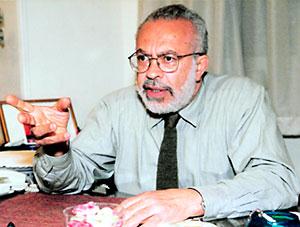(Ahlul Bayt News Agency) - Senior Egyptian political analyst Ashraf Bayoumi made the remark in an interview with IQNA, adding that millions of Egyptians took to the streets to show their anger at Muslim Brotherhood’s policies. Bayoumi, who resides in Washington D.C. said the situation in Egypt and whether what happened there was a coup or a revolution is a challenge for the US media. “I think it is not important what name you put on it, What matters is that a huge popular force made up of 22 million Egyptians stood up against Muslim Brotherhood’s rule. These people were demanding early elections after Mohamed Morsi’s government failed to deliver the objectives of the January 25, 2011 revolution. “What happened in Egypt in June 30 was not only an all-out revolution but a popular Intifada against Muslim Brotherhood’s policy toward Israel and the US and its domestic policies vis-a-vis religious minorities.” Bayoumi noted that one year is not enough to assess the realization of the objectives but it was enough to determine whether the government was moving in the right direction for building the future. He said Egyptian people came to the conclusion that Muslim Brotherhood was leading the country in a direction that was the opposite of what the revolutionaries wanted. “That is why they took part in the June 30 revolution more massively than they had done in the January 25 uprising.” The political analyst said the reason for people turning away from Morsi’s government was that Muslim Brotherhood followed the policies of the US in the region. He referred to the confirmation of the Camp David Accords and Morsi’s letter to Shimon Peres as examples of how the polices of Morsi’s government were in line with those of the US. Bayoumi said Morsi’s lack of support for the cause of Palestine, Muslim Brotherhood’s monopoly of power, appointing hated figures as heads of government organizations, and Morsi’s unreasonable hostility toward Syria and his joining the anti-Assad camp, were among other reasons for people’s anger at Morsi’s government. “Another reason was the killing of Shia Muslims in Egypt in the past month, which was provoked by a meeting of Salafists in which Morsi was present”. Asked what would be the future of Egypt if Muslim Brotherhood refuses to recognize Morsi’s ouster, Bayoumi emphasized that what is said about Muslim brotherhood’s capabilities and popularity is is an exaggeration. He explained that Muslim brotherhood’s supporters and Salafists make up less than 25 percent of Egyptian population at the best estimate. He went on to say that Muslim Brotherhood has two options now. “It can either accept the status quo and prepare itself for the next elections and apologize to the Egyptian people for all the mistakes it made in the past year, or declare war against the government and Egyptian people, which will end in its heavy defeat.”/149
source : IQNA
Saturday
20 July 2013
7:30:00 PM
443353

What happened in Egypt was not only an all-out revolution but a popular Intifada against Muslim Brotherhood’s policy toward Israel and the US and its domestic policies vis-a-vis religious minorities.
